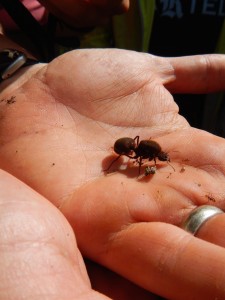Studying traffic behavior on leafcutter ant foraging trails at La Selva, Costa Rica
Research Overview
Scott Solomon has always been fascinated with the natural world and with all branches of science. As an undergraduate student at the University of Illinois, he studied cell and molecular biology and learned wet lab skills as a research assistant. But a semester in Ecuador and a research experience working with Martin Wikleski on marine iguanas in the Galápagos Islands got him hooked on two things: organismal biology and tropical field work—two themes that have subsequently pervaded his life.
His dissertation research with Ulrich Mueller at the University of Texas at Austin examined how geography influences population genetic structure in leafcutting ants and their symbiotic fungi, a project that took him across much of Central and South America. He also worked on ant diversity projects on tropical islands, including Cocos Island and Fiji.

After completing his dissertation, an IRFP postdoctoral fellowship from the National Science Foundation permitted Dr. Solomon to continue working on the evolutionary history of tropical ants, in particular the genus Trachymyrmex. Mauricio Bacci, Jr.’s lab at Universidade Estadual Paulista in Rio Claro, Brazil served as a base for field expeditions across all of the major ecosystems in Brazil, the world’s most biologically diverse nation.
After a year of fieldwork, Dr. Solomon returned to the United States and was hosted by the Entomology Department of the Smithsonian Institution in Washington, DC where he worked with Ted Schultz and others to reconstruct the evolutionary history of the higher attines, including Trachmyrmex and the leafcutters. He remains a Research Associate in the Ant Lab at the Smithsonian’s National Museum of Natural History.
In 2009, Scott Solomon joined the faculty at Rice University (in what was then the Department of Ecology & Evolutionary Biology; now BioSciences at Rice). His position as a Teaching Professor allows him to focus much of his attention on undergraduate education, while continuing to conduct research. Recent projects include studying the impacts of flooding from Hurricane Harvey on ant communities in the Big Thicket region of east Texas, foraging behavior of tool-using Aphaenogaster ants, traffic behavior in Atta leafcutter ants, and the evolution of fungus-growing ants and their symbiotic partners. Many of these studies are conducted through collaborations with colleagues in the USA, Costa Rica, and Brazil.
Learn more about Dr. Solomon’s research here or follow him on Google Scholar.
Aphaenogaster ants using tools to absorb liquid food